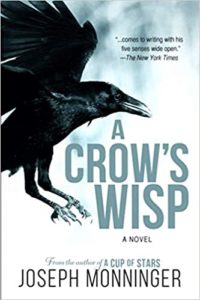Review — A CROW’S WISP by Joseph Monninger (Burkina Faso)
 A Crow’s Wisp
A Crow’s Wisp
by Joseph Monninger (Burkina Faso 1975-77)
Wood Heat Publishing
321 pages
January 2021
$4.99 (Kindle); $10.99 (Paperback)
Reviewed by Steve Foehr (Ethiopia 1965-67)
•
The crow has been a constant in eons of history, and a continuous thread through worldwide mythologies. In the Bible, the crow symbolizes divine providence. In China and Japan, crows are divine messengers, who show love and gratitude. For the ancient Celts, Romans, and Greeks, the crow could foretell the future. In the many Native American Crow Clans– Chippewa, Hopi, Absaroka, Tlingit, Pueblo, and many more tribes—the crow culture connects the past with the present and the future.
Crows have the reputation for being gossipy, disobedient, curious, cautious, a bit stubborn, and want the world the way they want it. They are a trickster, a smart aleck, feared as the souls of people who had committed suicide, and harbingers of luck, good and bad.
Joseph Monninger, in his novel, A Crow’s Wisp, manages the artful turn of giving the slippery crow a graspable crowsonality, without anthropomorphic tropes. His storytelling ability makes the fanciful a palpable reality, so the reader glides into the imagination as smoothly as, well, a crow alighting on a branch. You settle into his prose as you would with a favorite coffee mug in hand; the writing is solid, comfortable, and relaxing. You trust him not to disappoint, and he meets your expectation.
Monninger spins the fable in the best tradition of that form. The story is an adventure, with twists and turns, loveliness and hard cold reality, displacement, realpolitik, betrayal, coup plotting, loyalty, and alliances. It’s a bloody tooth-and-fang account, suspenseful as a murder mystery.
The chief characters, three crows, equivalent of young teens, are easy to identify with, as they are intelligent bipeds. Thumb, bold, curious, eager to learn what’s in the world, would be, in human terms, captain of the football team, voted most likely to succeed, and gets his driver’s license on his sixteenth birthday. His best friend, Go to Sleep Johnny, is tremulous but a swift and skillful flier, a late bloomer who accepts the mantle of leadership. Dilly, the slightly older female, is fearless, a leader with the character traits of a warrior-hero.
Their coming-of-age story is strategic thinking to survive in a dangerous world, accepting life without sentiment, and the belief that happy endings are possible. The corvid (crow) world and the homo sapien (human) world clash; civilization corrupting nature, armed teenage boys versus unarmed, but not powerless, crows, a rite of passage becomes a way of life. Monninger sums it up, without sermonizing: Humans, noisy and destructive, occupy nature; crows live integral with nature.
Crows existence is not idyllic, but as fraught with stress, conflict, ambitions, authoritarian constraints as the society we live in. Monninger’s use of Crow language to describe our world from their point of view gives useful clarity that we often do not see. Crows observing, acting, reacting to people, and people observing, acting, reacting to crows makes for an entertaining and acute commentary.
Some pearls of wisdom from Crow Doctrine: “Leaders always violate their own rules. That’s part of what it means to be a leader.” “Wisp (death) is all around us. . .Running from it is impossible. Crows live with Wisp. That’s our nature.” “Courage is not avoiding things, but accepting risks…Be smart about it, but welcome it.” A fundamental truth of Crow Doctrine: You are both prey and predator. That’s life.
From the beak of crows to your ear.
Monninger writes a rollicking scene of the three young crows persuading an obese pig, Coppertop, whose life has been spent in the mud and manure of a sty, to help steal the rifle the teenage boy uses to slaughter crows. In exchange, the crows will help Coppertop escape his inevitable fate of being butchered into beacon and chops. It’s Laurel and Hardy slapstick, which highlights the absurdity of all of it, from every point of view—crow, pig, human—that the great theater of life is a hoot, a caw, a snort, a shout. By the time you finish the book, you’ll be laughing and crying at the inevitability of life’s serious folly.
And don’t skip the footnotes: You’ll be delighted and rewarded with information otherwise missed.
•
Stephen Foehr (Ethiopia 1965-67) is the author of numerous nonfiction and fiction books. His crime mystery, Stealing Fortune’s Brick: The Audacious Tea Heist, was published June 2020. His latest novel, Warrior Love: Silas Loves Lili Weirdly Lili Loves Silas, about corruption, was released July 2021.
Can’t wait to read this story as we have flocks of smart crows living in our woods and nibbling in our field. I call to them when I set food scraps out on the stonewall then they fly by to examine the offering and call to their mates to come join the meal.
A very enertaining review and I will get to my book store for both the “Crows” and the reviewer’s recent works. Thanks.
In the greater Tokyo area (Kanto) crows are largely the reigning survivors. Interesting. As a flock may pick at garbage one perches high as a watch and in the event of danger/encroaching humans alarms the others. They have several vocalizations and in my youth we hunted them but they were even savvy to guns as in avoiding hunters carrying them. Amazing creatures. A nearby shrine has a three legged crow as its emblem which is also the emblem of the Japan Soccer League or J-League. Legend has it that a crow led the first delegation to the ancient capital of Yamato …